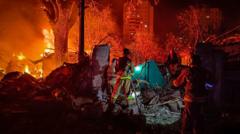As peace talks loom, families of approximately 16,000 Ukrainians held captive by Russia are growing increasingly concerned that their loved ones may be forgotten. With no mechanisms for civilian prisoner exchanges, the uncertainty is palpable as families await news amidst the ongoing conflict.
Families of Captive Ukrainians Express Anxiety Over Potential Peace Talks

Families of Captive Ukrainians Express Anxiety Over Potential Peace Talks
With nearly 16,000 Ukrainians still imprisoned, families fear their loved ones will be forgotten amid the ongoing war and fragile peace discussions.
In the heart of Bucha, Ukraine, the anxiety is palpable among families with loved ones missing in a protracted conflict. Tatyana Popovytch, who has been tirelessly searching for her son Vladislav since his capture three years ago, is among those haunted by uncertainty. After a tumultuous journey that included contacting numerous officials, searching mass graves, and enduring agonizing delays for letters from her son—who remains imprisoned in Russian custody—Tatyana's hope hangs by a thread. Just months after his abduction, a fellow inmate, Serhii, reported hearing Vladislav's voice while incarcerated, providing a glimmer of reassurance.
Despite this small comfort, the transition to peace remains daunting. Ukrainian authorities estimate nearly 16,000 civilians, including over 20,000 children, are still in captivity. With potential peace talks on the horizon, loved ones fear their remaining relatives could slip from memory without proper pathways for civilian repatriation. "When I attend official meetings, no one talks about getting the civilians back in the event of a ceasefire," lamented Yulia Hripun, who has been advocating for all civilians taken during the war, including her own father.
International discussions have proven fruitless, with many officials recognizing a lack of structured legal mechanisms to secure the return of civilians. Ukrainian human rights ombudsman Dmytro Lubinets expressed concern over current approaches, admitting a strategy for civilians' release is still largely undefined. Compounding the worry, some of these detainees face criminal charges from Russian authorities for their actions during the conflict, raising further barriers to their collective release.
The sporadic releases of civilian detainees—in remarkably low numbers compared to those captured—only intensify the heartbreak for families longing for the return of their loved ones. Petro Sereda, whose son Artym has been missing for over three years, lives in constant apprehension that any phone call might bring him news of Artym's status. Yet with every indication suggesting captivity may have lasting scars, the psychological toll on these families is immense.
As the conflict continues dragging on, those affected hold onto the hope of reunion, while also grappling with the possibility that prolonged captivity could deeply alter their loved ones. Tatyana expressed a profound emotional struggle, stating she anticipates an upheaval of feelings when Vladislav returns. "It is all I think about," she admitted—a sentiment echoed among countless families yearning for normalcy in the wake of war.


















